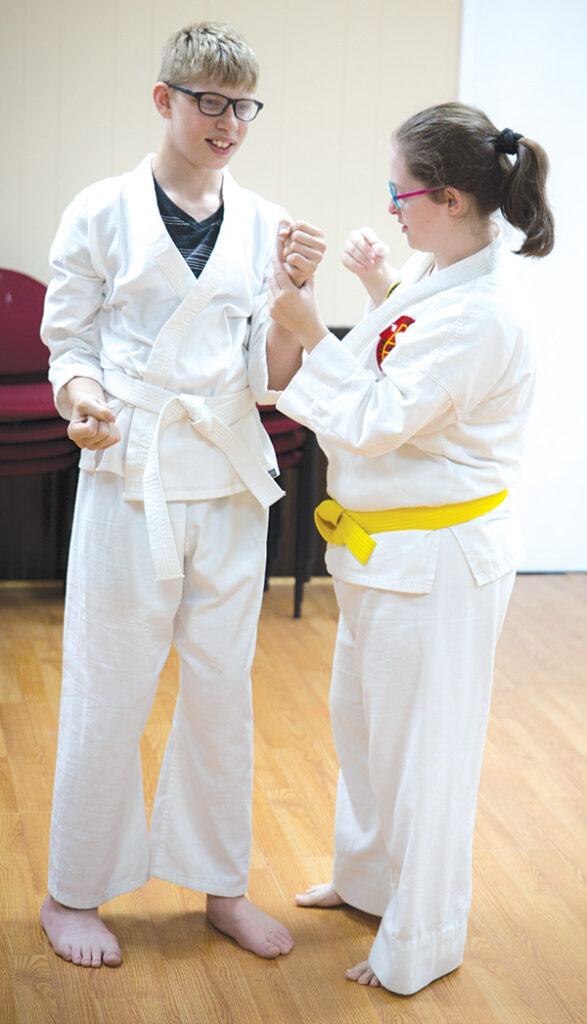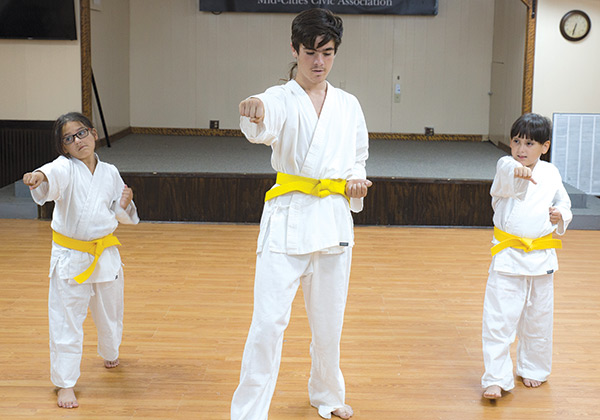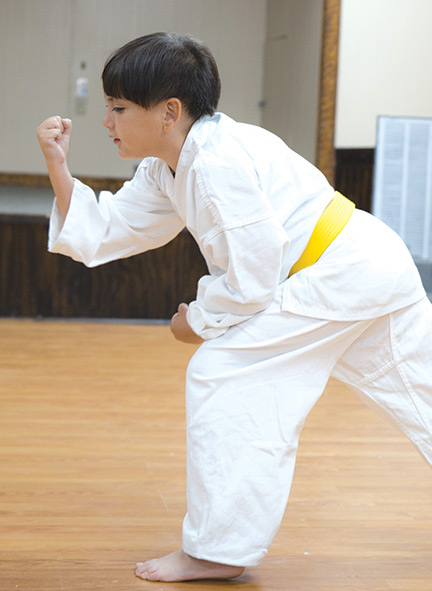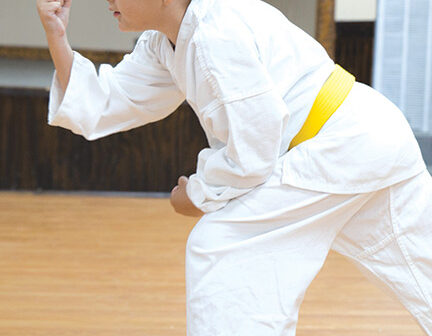
Instructor Mary Setzer, on right, helps student Avery Allen position his arms for a stance. (Radiant Snapshots) 
Corey Setzer leads exercises. (Radiant Snapshots)
Branden Rivadeneira practices a karate move during a Parts of Me Are Excellent karate class. (Radiant Snapshots)
When Mary Setzer was 4, she began taking karate classes alongside her brother, Justin, who was 2 1/2 years older.
“Justin and I were inseparable,” Setzer said. “I wanted to do everything Justin did.” The classes were no ordinary martial arts experience. Part of Southside Virginia Police Karate Association, they were designed with special needs in mind and known as Parts of Me Are Excellent.
“I learned karate between two wheelchairs,” Setzer said. Her brother, Justin, who suffered from spina bifida, “was in one and Mr. Brough was in one.”
Joseph Brough and his friend, Donald Radcliffe, started the special classes on Feb. 15, 1993, after Brough survived a car accident that left him a quadriplegic. “When we found them,” Setzer explained, “they were teaching classes at Children’s Hospital,” where Justin attended therapy.
According to Setzer, the classes continued until 2004 or 2005, when Brough became ill. Ten years later in 2014, Justin died, and Brough reached out to her. He and Radcliffe wanted her to bring the classes back to life. Setzer agreed, and on June 1, 2017, after several years of preparation, Parts of Me Are Excellent got its second life, with Setzer teaching classes at Mid-Cities Civic Association in Chesterfield and Celebration of Life Church in Colonial Heights.
Setzer adapts each karate session to her students’ needs. She has modified instruction for wheelchair use, intellectual disabilities, hearing loss and cochlear implants, to name a few.
“‘I can’t’ is not an option,” she said. “You can’t just walk away. You won’t adapt to life. These kids have taught me I have to learn different ways to do things.” For example, one of her students battles with brittle bone disease, rendering her unable to punch. “So we use her crutches,” Setzer explained. The student jabs with crutches for self-defense.
Setzer’s nephew, Corey Setzer, helps teach the classes. “I’ve learned discipline and how to manage my anger,” he said. “Learning breathing techniques to calm myself down has helped.” It helps with social skills too, he said.
When class begins, Mary talks to the students’ parents in the back of the room while Corey leads three students who’ve arrived for stretching exercises. The children talk animatedly and quietly to him, and it’s easy to see they love him. They laugh while he maintains a calm, commanding presence despite their silliness. He sits on the floor and tells them to grab their right foot. All three students grab their left foot, mirroring him. He lets it go.
After the stretching session is complete, Mary takes center stage. “Ready stance,” she tells the students. Anahi Rivadeneira, 8, is two years younger than her brother, Branden, but she is quick to correct his mistake when he fails to find ready stance promptly. “Branden! Ready stance!” she commands. Branden complies.
Once all the students stand ready, Corey approaches them one by one with a blocker: a large foam baseball bat. He calls out commands like “high block!” and “right block!” as he swings the blocker at each student, and they raise their arms accordingly. Anahi giggles as she inadvertently blocks with the wrong arm and the blocker comes down lightly on her head.
Carlos Rivadeneira, Anahi’s and Branden’s father, explained that Branden suffered a traumatic brain injury in a car accident in 2009 when he was four months old. “I was getting ready to be deployed,” Carlos said. “I was bringing him to meet his grandfather in Rochester, New York, and we got into a car accident. Branden was ejected from the car.” Branden spent over two months in the ICU in Rochester. “We came back after that and I deployed in August to Iraq,” Carlos said. Branden was left with “a big old scar on his head, and my wife took care of him while I was deployed,” Carlos said.
His wife, Hilda, learned of the classes through Virginia Commonwealth University, where Branden sees a psychiatrist for annual evaluations. “She is totally devoted to him and my daughter,” Carlos said of his wife. Anahi doesn’t struggle with any disabilities, she she takes the class with her brother.
At one point during a recent class, Corey worked with the two siblings while Mary focused on Avery Allen, 13, who began the classes this past winter. All the students were enthusiastic and engaged. They looked to their instructors, eager and expectant.
One by one, the students stepped away from class to answer questions. As Branden, the first to leave, approached, his mother barked from across the room, “Bow out!” Obediently, Branden stopped, turned to face the Setzers and offered a respectful bow before resuming.
Branden said he likes when the instructors “do some new moves and when we do our stretches. I like spinning my arms because it feels good.” The most important lesson he learned, he said, “is bowing to pay respect to sensei.” He is careful to remember to bow before he returns to class.
Anahi said “learning how to protect ourselves is my favorite. I learned how to use my arms to block.” She added, “Also, sometimes Ms. Mary is busy, but she drops all her stuff to help us out.”
Allen said that punches are his favorite skill. He likes “punching the red bag and beating up Corey.”
When all three students had returned to instruction, the instructors led them through several moves. In quiet voices, they issued a command and the students repeated it, performing the motion. The moves were punctuated with exclamations of “Ki-yah!”
“What are the three reasons for a kiai?” she asks them.
Anahi said it tightens the abdominal muscles. The other students were silent. Mary offered a few hints, and it eventually it came out that the kiai shout also shows power and is known a “spirit shout,” a sort of cheer.
“I love this class,” Mary said. “It helps a lot. I get very depressed, and it pulls me out of that because I come for this class. This is the highlight of my week.”
Looking around the room at Mid-Cities Civic Center, one can see people overcoming their challenges. Everyone is battling something. Mary struggles with depression. Corey worries about anger management and social skills. Branden lives with a traumatic brain injury. And yet the smiles are evident.


